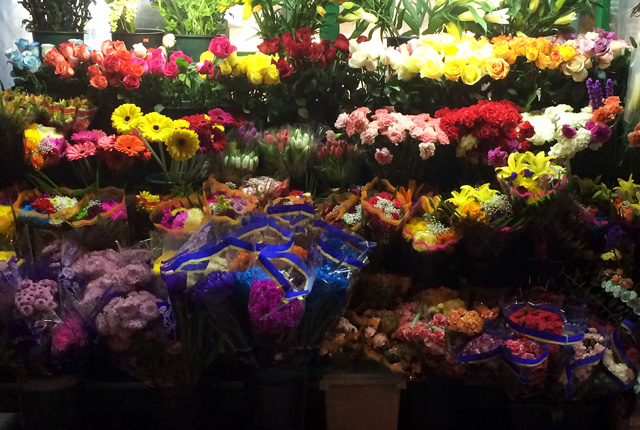By Sabrina Sandrelli
In the neighborhood of Fordham people call Honorio Ramirez the flower man. Ramirez, 46, has been a florist for five years, after immigrating from Mexico in 2010. “I love flowers and plants,” he says. “They are my passion.” He began working in a florist shop in Manhattan and then started his own floral street vending business in 2011. He buys many of his flowers from markets in Hunts Point and he makes arrangements for weddings, funerals and graduations.
Ramirez’s love of nature came early in life. His parents owned a farm in Mexico, where he milked cows and rode horses. He decided to emigrate to the U.S. because he was not making enough money to support his family on the farm. He explains friends encouraged him to come. “Ramirez, they said, come to New York, there’s work there they pay well, the money has more value in Mexico.”
He had come earlier, in 2003, but was deported in 2006. He left Guerrero, Mexico, and crossed the border into the United States seeking work. “I went to live in Washington D.C,” Ramirez says. “I was doing good there. I would clean restaurants and buildings. I used to do maintenance work at ESPN. They found out they had people working with no papers.”
Ramirez said he was handcuffed and taken to a precinct. “I spent the night in jail,” he said. The next day Ramirez was taken to the airport and told that he had to go back to Mexico and that he couldn’t come back to the United States for five years.
But he didn’t wait the five years, returning in 2010. “I dared to come back for my children,” he says. “I wanted to give my children a better life than I had growing up. People in Mexico cannot find jobs. There is a lot of corruption in politics. It was more complicated to come back, I paid $4,500 when I got to the United States.”
Ramirez said some friends lent him the money for the trip. It took a week for Ramirez cross. A “coyote,” or guide, took Ramirez and others across the border from Tijuana to the United States.

“I told St. Guadalupe and God to help me through all this,” he said. “The problem with crossing the border is that you have to cross it at night and it is very dangerous. At night a snake or a scorpion can bite you and the bite can be fatal.”
It takes two days of walking to cross the border at night, says Ramirez. “People don’t take showers and they don’t eat well,” he adds. “When you are walking in the dark you have to be very careful because you can hurt your feet and break your ankle and if no one finds you in two days a coyote can eat you.”
In addition to the physical dangers, drug rings prey on immigrants, he says. “The Mexican mafia can grab you and force you to carry drugs to the United States, they can use you as a mule,” he says. “If you refuse to do it, they kill you.”
Women are particularly vulnerable when they try to cross the border and sometimes risking being raped, he says. “I came with my niece and the coyote was trying to grab her to rape her,” he said. Other times, the arduous trip proves too much. “Two women stayed behind because it was too much walking,” said Ramirez. “The coyotes wanted you to keep hurrying up and the women couldn’t keep up and they had to go to the highway and wait for the police to pick them up because they couldn’t walk anymore.”
Zahra Draco, owner of a fish market near where Ramirez sells flowers, says he “is a gentle man and helps me with anything.”
Karina Cruz, one of Ramirez customers he does excellent work. “I love the way he fixes my flowers,” said Cruz.
His day is long but Ramirez says it is worth it and that he believes the U.S. is the land of opportunity for those willing to work hard. “I want a better life for my children, so they have the things I didn’t have.”



